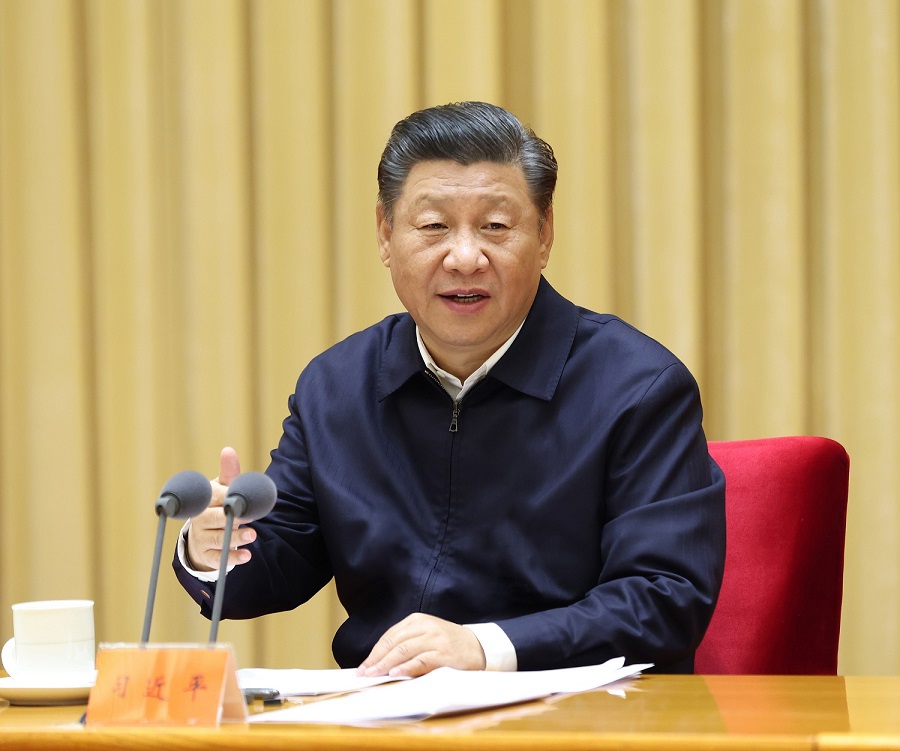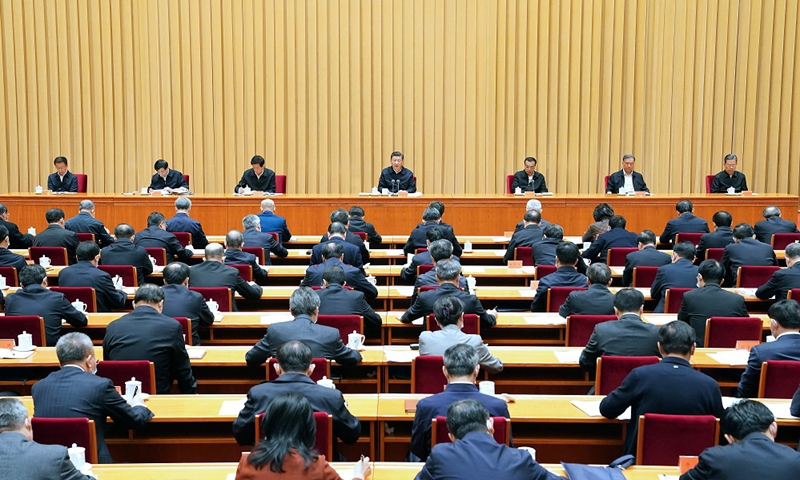
Chinese President Xi Jinping, also general secretary of the Communist Party of China Central Committee and chairman of the Central Military Commission, delivers an important speech while attending the central conference on work related to overall law-based governance held in Beijing, capital of China. The conference was held in Beijing on Monday and Tuesday. (Xinhua/Pang Xinglei)
China has vowed to accelerate the establishment of laws on matters involving foreign parties amid the US' suppression on Chinese companies and Western countries' smearing of China during the COVID-19 pandemic, which experts said is a necessary and helpful move to better protect the interests of China and Chinese companies during globalization.
The Chinese central government held a conference on work related to overall law-based governance in Beijing on Monday and Tuesday.
President Xi Jinping stressed taking a coordinated approach to promoting the rule of law at home and in matters involving foreign parties, demanding efforts to better safeguard national sovereignty, security and development interests.
Xi urged efforts to respond to major challenges, withstand major risks, overcome major obstacles, and address major conflicts in accordance with the law.
As China is irreversibly engaging in the process of globalization, one of the most important aspects of establishing laws in matters involving foreign parties is to protect the rights and interests of Chinese companies that go overseas, Zhu Wei, a communications researcher at the China University of Political Science and Law in Beijing who specializes in cyberspace security, told the Global Times on Wednesday.
China in August released the most sweeping adjustments in more than a decade to the catalog of technologies that are subject to export controls to include certain items related to artificial intelligence and computing technologies.
The move came amid the widely reported forced sale of Chinese short-video app TikTok's business in the US, which Chinese experts and officials harshly criticized as "modern piracy" and state-sponsored robbery by the US of a valuable Chinese firm.
It would establish a policy and a regulatory foundation for Chinese regulators and companies to protect their core technologies from being arbitrarily taken away, Chinese experts noted.
Zhu noted that some Western countries' unreasonable suppression on China and Chinese companies is more of a political issue than a legal one.
"We should still try to protect our rights and interests as much as possible from the legal level so that we can reciprocate and counteract as much as possible with the law when similar situations occur in the future," Zhu said.
Thirty-five Chinese lawmakers raised a special motion in May during this year's two sessions, urging the country to speed up formulating a foreign states immunity law that will grant Chinese citizens and companies the right to sue other countries in domestic courts, in an attempt to retaliate for US abuse of litigation against China over the COVID-19 pandemic.
Such a move will ensure Chinese citizens' and companies' right to sue the US over its blame game and cover-up of information during the pandemic, and is necessary to safeguard its national interests and enterprises' legitimate rights amid the complex and volatile international situation, Chinese experts said.
China adopts the principle of absolute immunity of foreign state sovereignty and their property, meaning that Chinese citizens, companies and governments have no legal right to sue other countries in China's courts. In contrast, the US, Canada, the UK and the EU follow the restrictive immunity principle, which allows their citizens and companies to sue foreign countries, individuals and enterprises in their homelands.
Qin An, head of the Beijing-based Institute of China Cyberspace Strategy, noted that while providing legal support for Chinese companies, China should also make efforts to earn more rulemaking authority in certain industries to counter foreign countries' unreasonable suppression, which is also an important part of establishment of laws in matters involving foreign parties.
The Chinese government in September proposed the Global Initiative on Data Security at an international seminar on "Seizing digital opportunities for cooperation and development," which came a month after the US government proposed a 5G "Clean Network" initiative that calls for a complete removal of "untrustworthy" Chinese equipment and technology products in five areas - telecom operators, mobile applications, app stores, web-based cloud services and undersea cables - and calls on other countries to follow suit.
The "Clean Network" initiative is clearly exploiting the absence of rules in information technology to try to build a cybersecurity framework around US interests, experts noted.
Experts have also called for improving the extraterritoriality of China's laws to bridge them with international laws to handle potential disputes.
"For example, when promoting the Belt and Road Initiative (BRI), a corresponding dispute resolution mechanism has been designed, which BRI countries are encouraged to use to resolve trade disputes under the initiative," Peng Qinxuan, an expert on international law from Wuhan University, told the Global Times.

Chinese President Xi Jinping, also general secretary of the Communist Party of China Central Committee and chairman of the Central Military Commission, delivers an important speech while attending the central conference on work related to overall law-based governance held in Beijing, capital of China. The conference was held in Beijing on Monday and Tuesday. (Xinhua/Pang Xinglei)
